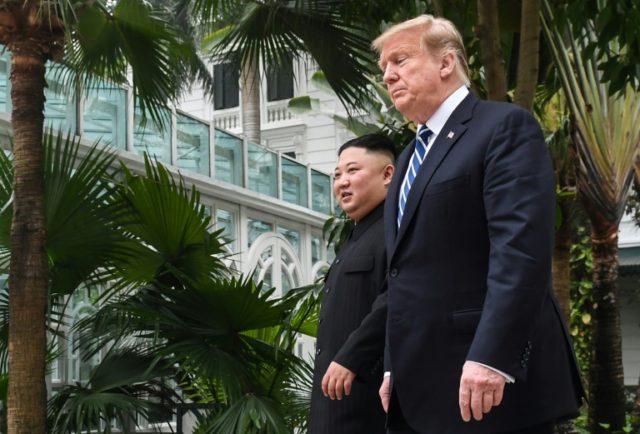The South Korean government expressed regret on Thursday that President Donald Trump and North Korean dictator Kim Jong-un could not reach an agreement in Hanoi. South Korea applauded the progress made so far and said it remains committed to dialogue with North Korea.
South Korea’s presidential Blue House said on Thursday that President Moon Jae-in spoke with Trump for about 25 minutes by telephone after the Hanoi conference ended prematurely.
Trump sought Moon’s opinion of the summit results. The South Korean leader replied that he “looked forward to President Trump’s abiding commitment and determination to accomplish the historic task of ushering in a new era of peace by ending the age of conflict and confrontation fueled by the world’s last remaining Cold War rivalry on the Korean Peninsula.”
The Blue House said Trump and Moon would work together to pursue a diplomatic solution to North Korea’s nuclear weapons:
President Trump made himself clear that he is committed to seeking a settlement through dialogues with North Korea going forward while expressing his feelings over not being able to reach an agreement at this summit. In addition, President Trump asked President Moon to play an active role as a mediator by conversing with Chairman Kim Jong Un and later informing him about the results of those conversations. President Trump went on to say that they should closely cooperate to ensure that North Korea would implement denuclearization in a practical manner.
President Moon suggested that he and President Trump meet in person and continue more in-depth discussions in the near future. President Trump concurred and proposed that the details be discussed through diplomatic channels.
A statement from Moon’s office called it “regrettable” that Trump and Kim were “unable to reach complete agreement at their summit.”
“However, it seems clear that they have made more meaningful progress than at any time prior,” the statement continued. “We note that the two leaders have expanded the scope and depth of their understanding of each other’s positions through in-depth and long discussions.”
Rather than lamenting North Korea’s reluctance to take the steps necessary to achieve full denuclearization and obtain relief from sanctions, the Blue House optimistically said discussions between North Korea and the U.S. have been “raised to a new level” because each side has a better understanding of what the other wants.
“The Korean Government will do all it can to ensure that the United States and North Korea can maintain momentum for dialogue while continuing their close communication and cooperation,” the statement concluded.
The Associated Press predicted the chances of Kim holding another summit with Moon, and perhaps paying a historic visit to Seoul, were diminished by the failure to reach an agreement in Hanoi:
Moon may find it difficult to sell a Seoul visit by Kim to South Koreans without tangible progress on North Korea’s nuclear disarmament. Kim is also likely to be reluctant to travel to South Korea without having something big to bring home, especially after getting nothing in Vietnam, where he arrived after traveling through China on his private train for more than two days.
The Korea Times said the failure of the Hanoi summit “shocked the world since the two leaders started their encounter in Vietnam on a very positive note.” However, the remainder of the editorial made it seem unlikely an agreement could have been reached because North Korea wants sanctions relief before taking irreversible denuclearization steps but the U.S. wants the reverse.
The Korea Times said the most “worrisome” aspect of the Hanoi stalemate is that “Pyongyang could react in a hostile way.” It recommended President Moon come up with an alternative to pushing hard for Kim’s visit to Seoul or attempting to jump-start inter-Korean economic cooperation.
China reacted to Hanoi much as South Korea did, portraying denuclearization as a long and difficult process which has only just begun.
“I have always hoped that everyone can realize that the nuclear problem on the Korean peninsula has been going on for many years and that solving this problem is definitely not something that can be achieved overnight,” Chinese Foreign Ministry spokesman Lu Kang said.
The Chinese government invited Kim Jong-un to meet with President Xi Jinping when Kim’s train passes through China on its way back to North Korea.

COMMENTS
Please let us know if you're having issues with commenting.